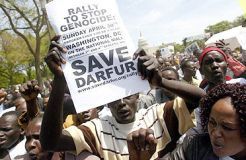Protests in US cities seek to “Save Darfur”
April 30, 2006 (WASHINGTON) — Tens of thousands of demonstrators, including lawmakers and Hollywood star George Clooney, descended on Washington and other US cities Sunday to demand an end to “genocide” in Sudan’s Darfur region.
 Protesters converged on the National Mall in warm spring weather near the Capitol that houses the US Congress, seeking to “Save Darfur Now.”
Protesters converged on the National Mall in warm spring weather near the Capitol that houses the US Congress, seeking to “Save Darfur Now.”
The first speaker, Holocaust survivor and Nobel laureate Elie Wiesel spoke “as a Jew and as a member of the human family,” saying: “Silence helps the killer, never the victims.”
“For the sake of humanity, save Darfur,” he told the mostly young crowd, many of whom wore yarmulkes.
Demonstrators cheered calls for US and international action from a wide range of religious leaders, activists, politicians, celebrities and athletes, including Joey Cheek, an Olympic speed-skating champion who gave his prize money to benefit Darfur.
“It’s our job to take action,” he said. “We have to continue to fight because people will continue to die.”
Clooney addressed the protest after having visited Sudan’s western region of Darfur last week along with his father, a former journalist.
“This is in fact the first genocide of the 21st century. But there is hope, there is all of you,” said Clooney, who gave numerous interviews before the event to try focus public attention on the plight of Darfur.
His father, Nick Clooney, said, “We didn’t stop the Holocaust. We didn’t stop Cambodia. We didn’t stop Rwanda. But this one, we can stop.”
Sudanese pro-government Arab militias have terrorized Darfur’s black African tribes, with the conflict leaving up to 300,000 dead and 2.4 million homeless.
Similar rallies were announced by some 1,260 groups in more than a dozen US cities, including Austin, Texas; Chicago; San Francisco; and Seattle in the US state of Washington, as well as Toronto and Vancouver, Canada.
The United Nations has slapped sanctions on four Sudanese leaders for their role in the Darfur carnage and has been discussing a beefed-up UN peacekeeping force.
Earlier, US Secretary of State Condoleezza Rice made clear growing US impatience with some governments for their reluctance to confront Sudan.
“We also do need more support, frankly, from other members of the international community, from China, from Russia, which abstained on this (sanctions) resolution.”
“And I was at NATO on Thursday and Friday, we had talk about getting more support from the African Union which has said that they want to see a UN force,” she told ABC television on Sunday.
Rice said President George W. Bush “has passion” about the Darfur issue and added, “We cannot be in a situation in which we don’t react to this.”
The United States has been pressing to expand a beleaguered 7,000-member African Union peacekeeping contingent in Darfur into a large UN force with greater logistical support from NATO.
US legislators also spoke at the protest, including Nancy Pelosi, leader of the Democratic minority in the House of Representatives, and Democratic Senator Barack Obama, who said: “If we care, the world will care. If we bear witness, the world will know. If we act, the world will follow.”
The conflict has surged as a top issue in Washington as peace talks under way in Nigeria faced a deadline on Sunday. Mediators hoped to salvage a peace agreement but two rebel groups said they would refuse to sign the deal.
Bush, who has called the Darfur violence genocide, met with activists lobbying on behalf of victims Friday, while several US lawmakers were arrested in a protest outside the Sudanese embassy in an act of civil disobedience.
After his meeting with activists, Bush pressed the government of Sudan to end the violence in the region.
But Khartoum has rejected international criticism and resisted the UN.
The Sudanese embassy in Washington issued a statement Friday calling the protests “misdirected” and “naive.”
“The message that will be sent by the demonstrators to the Darfur rebels is, ‘don’t make peace, the US supports you,'” the embassy said in a press release, adding that such protests send “the wrong message at just the wrong time.”
(ST)
